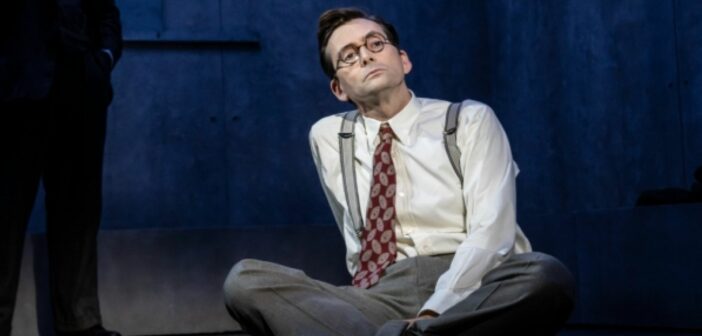This portrayal of C.P Taylor's 'Good' is a horrifying must-watch
Dominic Cookes rendition of C.P Taylor’s ‘Good’, follows the moral deterioration of John Halder (David Tennant), an anxiety-riddled professor who is viewed as a moral and sensible figure by those around him. Beginning in Germany in 1933 at the heart of the rise of the Nazi Party, this play toys heavily with the justification of evil, and the morality in doing what is good for the self, rather than for all. In this performance, Tennant plays Halder throughout, while Elliot Levey (Maurice) and Sharon Small (Anne) rotate roles as Halder shifts between scenes. Whilst we follow Tennant’s fantastically performed moral deterioration, the supporting performances from Small and Levey are remarkable.
A man experiencing somewhat of a mid-life crisis, Halder takes the audience through his memories, marked by distinct phases of music from the time. Halder dutifully acts as both ‘father’ and ‘mother’ to his children following his wife’s struggle with an incapacitating mental illness; while also caring for his dementing, vulnerable mother. Tennant is wonderfully unsettling in his portrayal of a ‘normal’ man who is bound by duties to his family, with eyes that glint of resentment while making seemingly loving gestures of support to the women in his life. Tennant’s caring smiles acts as a mask for a man seemingly void of empathy and affection, for he receives none in return from his family. Halders one meaningful connection is with his only friend Maurice, a Jewish professor. The pair often meet to drink coffee and critique the rise of Hitler, reassuring each other that the rise of anti-semetisism can only be temporary. Tennant and Levey’s scenes together are an interesting dynamic, with Tennant portraying a clear emotional detachment towards his friend despite claiming to value their connection above all else, even nodding to the friendship being near homosexual in nature. Halder frequently dismisses Maurice’s anxieties, reasoning that the Nazi’s persecution of the Jews ‘is a temporary racist aberration’ that will be abandoned in favour of other promised policies. Levey’s captivating performance of a desperate but trusting Maurice results in their relationship being the most significant source of Halders guilt throughout the play, with the two devolving from loyal equals to persecutor and victim.
Following a period of high stress while caring for his mother, Halder makes a vital first sin in publishing a passionate essay promoting euthanasia. This attracts the attention of leading Nazis, and Halder is seduced into joining the party. Maurice and Halder battle over the morality of both this decision, and Halders sudden move to leave his wife following an affair with his student, Anne. During this heated, swear-laden conversation, Tennant has a surprise song number about whether to leave Germany or run away into the woods with Anne, bringing surreal comic relief to an otherwise heavy plot.
However, Halder then becomes charged with leading book burnings at the University, cementing his decent into moral hell. Bathed in blue light, Tennant turns to the audience to monologue his feelings of fear, before his expression becomes cold and pleased having reassured himself of his actions. Halder obliges, justifying it as symbolism for University valuing books before the life experiences of students. Selfishly, Halder steals books of personal value to enjoy privately, at the cost of the destruction of knowledge to others. This scene marks a clear turn for the worse, and as the flames on stage flicker, the feelings of discomfort within the audience are palpable. In spite of occasional moral panics, Halder climbs Nazi ranks. Following his controversial essay, a letter of recommendation from Hitler himself makes Halder responsible for a top secret national project – the euthanasia of those with disabilities. Whilst the audience immediately recognises the sinister implications of Halders project for other vulnerable social groups, Halder confidently believes that this is an opportunity for him to provide a kind and ethical “good” for a ‘suffering’ population. Throughout the play Halder is referred to as a “good man”, but the more he falls into Nazism, the greater the consequence is to the justification he puts on his troubling actions. Sharon Small is hypnotising in frequently switching between playing the gentle and supportive Anne, and Halders main male Nazi confidant, a character which encourages Halder to normalise his increasingly severe crimes. While Anne and Halder enjoy a comfortable and indulgent life within the party, both privately hold doubts towards the ethics of their actions.
A key scene within the play is the Night of Broken Glass. The stage plunges into darkness for several visual-less minutes, with strikingly loud screams and sounds of mass violence resulting in feelings of horror. Halder is present at the event and left stunned by the reality of what he is now a part of, before seeing a crying Maurice in the streets. Defensive, Halder angrily says the violence towards Jews is their own fault for not leaving the country sooner, while looking into the eyes of a defeated Maurice who now understands his families fate. However, Halder has repeatedly refused Maurice’s pleas to help him escape, and in blaming Maurice for his own suffering, Halder fatefully buries any personal responsibility. This final scene with Maurice hammers home that the right thing to do is often not the easiest, and Halders selfishness carries a terrible price.
The play ends with its horrifyingly striking, and only, costume change. Halders ‘survivalist’ choices to better his own life, lead him to oversee the first trains to Auschwitz in 1939. The damning personal consequences for Halders some six years down the line, can only be imagined. Significantly, the characters in this play were never innately evil or sadistic, but normal and consistently described as ‘good’. Their desires for job security, safety, and belonging were granted at a cost to others, and the ease in which they distanced themselves from the reality they created was deeply uncomfortable to witness. Halder even comments to the audience at a late stage that his fellow high ranking SS members didn’t seem “normal” but strange and emotionless. There is constant cognitive dissonance from this fallen man, who cannot understand or accept the nightmare that his life has become. This play carries serious reminders for what happens when social groups with small voices are pitted as scapegoats for the problems of the average working man.







